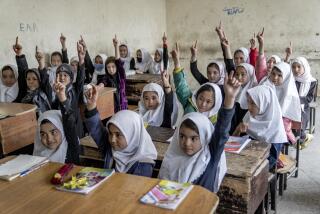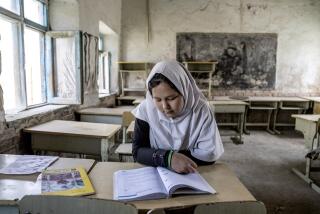Children’s Health Tops UNICEF List
- Share via
KABUL, Afghanistan — Touring a home-based school Saturday that had defied the Taliban’s ban on female education, U.N. Children’s Fund chief Carol Bellamy praised the dedication of women who risked punishment by working outside the home as teachers.
Students sat on the floor, shoulder to shoulder, packing the tiny classrooms at the Flower School, a small mud-brick building in western Kabul with 300 boys and girls. Scores of such home-based schools emerged in recent years as parents searched for ways to educate their daughters.
“It’s unfortunate for the girls, who have been denied an education in the past few years, that an alternative system had to be created,” Bellamy said. Education for boys also suffered because most of Afghanistan’s teachers are women, whom the Taliban did not allow to work.
“The education system here, of all the government systems, has been functioning the least,” Bellamy said.
In a two-day visit, she is emphasizing the need to rebuild the education system in a country where only 25% of the men and 5% of the women are literate. But UNICEF’s priority will be ensuring the health of children through the Afghan winter.
“This is a country in terrible shape,” Bellamy said. “Conditions for kids in this country generally, and largely because of the war and the drought, are some of the worst in the world.”
Half of Afghanistan’s children are malnourished, and 1 in 4 does not live to the age of 5, according to the United Nations. The situation has steadily worsened as the warfare in Afghanistan has dragged on for more than 20 years.
At the Flower School, conditions are spartan in the extreme. There are no chairs or desks. Some kids don’t even have notebooks and write on lap-size chalkboards. The school opened a year ago, one of 95 that UNICEF has helped support through an Afghan aid group, Sorvach.
“During the Taliban’s time, we faced a lot of problems,” said Gul Mohammed Ahmadi, the head of the group. “Several times I was warned not to do this, but I wasn’t going to stop.”
The network of schools aided by Sorvach has 7,500 students and 375 teachers, most of them women. While the schools are coeducational, boys and girls have separate classrooms.
Taliban authorities were aware that home-based schools existed and at one point gave tacit approval. They later said the schools were not permitted but did not take action to close them.
The Flower School was initially free but later began charging 30 cents a month to cover some expenses, including pay for teachers. That modest fee led 200 of the 500 students to drop out, teachers said.
The country’s public school system closed last month for the winter and will not reopen until March. But the home-based schools are still operating.
Although all children should be able to attend public schools when the new school year begins, some are expected to remain in the home schools.
UNICEF ended its support of Afghanistan’s public schools several years ago after girls were barred and has been aiding the home schools.
“We will continue to support the home schools,” Bellamy said, “but we will clearly emphasize very much the public schools.”
UNICEF is seeking $108 million to help Afghanistan’s children through the winter and has so far received pledges of about $40 million.
More to Read
Sign up for Essential California
The most important California stories and recommendations in your inbox every morning.
You may occasionally receive promotional content from the Los Angeles Times.













